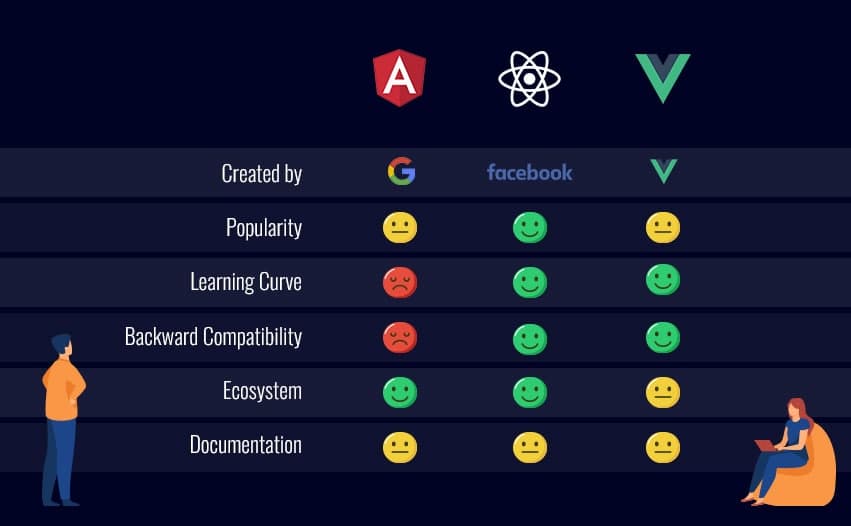In the fast-paced world of web development, choosing the right JavaScript framework is a critical decision that can significantly impact the success of your software projects. With a plethora of options available, three front-runners have emerged: React, Vue, and Angular. At Web Code Care, we understand the importance of making informed choices, and in this blog post, we conduct a comprehensive analysis of these JavaScript frameworks to help you navigate the landscape and make the best decision for your software development needs.
The Framework Showdown: React vs. Vue vs. Angular:
Before diving into the comparison, let's briefly introduce the contenders:
1. React:
React, developed and maintained by Facebook, is a popular library for building user interfaces. It emphasizes component-based architecture and virtual DOM, allowing developers to create dynamic and interactive interfaces efficiently.
2. Vue:
Vue.js is an open-source JavaScript framework that offers a progressive approach to building user interfaces. Known for its simplicity and ease of integration, Vue.js is gaining traction for its flexibility and seamless learning curve.
3. Angular:
Angular, developed by Google, is a full-fledged JavaScript framework that provides tools and features for building complex web applications. It emphasizes a declarative approach to building UIs and offers features like two-way data binding and dependency injection.
Web Code Care's In-Depth Comparison:
At Web Code Care, we've meticulously evaluated React, Vue, and Angular across various dimensions to help you make an informed choice:
1. Learning Curve:
React offers a relatively low learning curve, making it accessible to developers of varying skill levels. Vue also boasts an easy learning curve, making it an excellent choice for beginners. Angular has a steeper learning curve due to its comprehensive feature set.
2. Performance:
All three frameworks offer solid performance, with React's virtual DOM and Vue's optimized rendering engine contributing to fast updates. Angular's performance is enhanced by Ahead-of-Time (AOT) compilation.
3. Flexibility and Scalability:
React's component-based architecture and one-way data flow promote flexibility and modularity. Vue's progressive design allows you to integrate it incrementally into existing projects. Angular's comprehensive framework is suitable for large and complex applications.
4. Community and Ecosystem:
React has a vast community and a rich ecosystem of third-party libraries. Vue's growing community and ecosystem make it a compelling choice. Angular benefits from strong backing by Google and has a well-established ecosystem.
5. Documentation and Support:
React, Vue, and Angular all offer extensive documentation and active community support, ensuring developers have access to resources and assistance.
6. Integration and Adoption:
React can be seamlessly integrated into existing projects, and its popularity ensures widespread adoption. Vue's adaptability and simplicity make it an attractive choice for startups and smaller projects. Angular is suitable for enterprise-level applications with complex requirements.
Conclusion:
Choosing the right JavaScript framework is a nuanced decision that depends on your project's requirements, team expertise, and long-term goals. React, Vue, and Angular all have their strengths and are tailored to different use cases. At Web Code Care, we have expertise in working with all three frameworks and can guide you toward the best-fit solution based on your unique needs.
Stay connected with Web Code Care as we continue to explore and harness the potential of JavaScript frameworks, delivering software solutions that align with the latest industry trends and best practices. If you're seeking a partner that understands the nuances of React, Vue, and Angular, reach out to us today.

 August 04, 2023 - BY Admin
August 04, 2023 - BY Admin